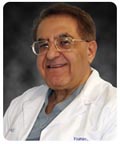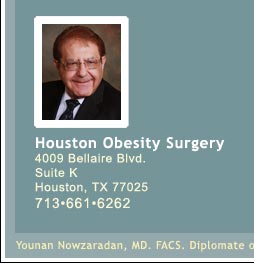Frequently Asked Questions
The following are some of the questions we most frequently have asked at Dr. Nowzaradan's clinic. By no means are these, nor should these, be ALL the questions you need to ask. We are committed to keeping all of Dr. Nowzaradan's patients well-informed and you are encouraged to ask as many questions as you want.
It is very important that you feel comfortable with your decision regarding weight loss surgery, and the best way to gain that comfort is to feel welcome to inquire about any aspect of the sugery. No question is trivial when it comes to your health and your confidence. |
|
| Q |
How dangerous is morbid obesity? |
| A |
Morbid obesity is an extremely dangerous, life-threatening disease. The yearly death rate for the morbidly obese is usually 10 to 12 times as great as that for people of normal weight. The risk involved in remaining morbidly obese for only one year is 8 to 10 times greater than the risk of undergoing weight loss surgery.
|
| Q |
How successful is surgery for control of morbid obesity? |
| A |
Studies indicate that long-term significant weight loss occurs in as many as 87% of patients when they actively participate in an after-care support program.
|
| Q |
When will I begin losing weight after surgery? |
| A |
You will probably begin to lose weight immediately. Most patients experience weight loss while still in the hospital.
|
| Q |
How long will I continue to lose weight? |
| A |
Most weight loss usually occurs in the first 12 to 18 months following surgery.
|
| Q |
Will the surgery make me look different? |
| A |
The most noticeable change is, of course, the loss of weight. Occasionally, weight loss can result in loose stomach skin. Most procedures are performed laparoscopically but if your procedure is performed using an open incision, you will also have a mid-line abdominal scar. If desired, the loose skin and scar can be corrected by a subsequent surgical procedure.
|
| Q |
Does the surgery cause many side effects? |
| A |
Following the surgery, there are the usual forms of discomfort. Even after full recovery, overeating can be painful. Depending on the weight loss procedure you have, side effects vary. Some vomiting may occur if you eat improper types or amounts of foods. For the most part, however, if you do not over eat or indulge in an improper diet, side effects are infrequent and mild and, generally, not nearly as severe or threatening as remaining obese.
|
| Q |
Are there restrictions in the types of food that can be eaten after surgery? |
| A |
You should avoid soft foods or liquids that are excessively high in calories. You will be able to enjoy small, normal meals.
|
| Q |
When may I resume "normal" eating? |
| A |
For the first 6 weeks following surgery, you will be restricted to liquids, pureed food and a few selected soft foods. This diet will allow your tissues to heal properly. Afterwards, normal foods are reintroduced and there are no restrictions on eating well-balanced meals.
|
| Q |
Will I have to make any changes in types of foods or eating habits? |
| A |
For the best results, you should eat small, well-balanced meals. Depending on your dietary needs, 3 to 5 small meals may be eaten daily. A liquid or chewable vitamin supplement will become a required part of your routine daily diet.
|
| Q |
How long must I remain off work? |
| A |
Depending on the type of work you do, you may be ready to return to short sedentary tasks within two weeks. Mild labor may be resumed within 3 to 4 weeks. The time of your return to work will depend on the demands of your job and the rate of your recovery.
|
| Q |
When can I begin to drive? |
| A |
Depending on how you feel, driving may be resumed after ten days.
|
| Q |
When can I resume sexual activities? |
| A |
Since sexuality varies widely, this question can only be adequately answered after personal consultation with the surgeon.
|
| Q |
Does stomach surgery affect pregnancy? |
| A |
Pregnancy should be avoided until after the period of rapid weight loss has passed (18 to 24 months).
|
| Q |
Does the surgery cause a "Dumping Syndrome" |
| A |
"Dumping syndrome" is an occasional side effect of the Roux-en-Y (Gastric Bypass), surgery. It consists of cramps, diarrhea, sweating and weakness. It frequently occurs as a result of the excessive consumption of sweets. The syndrome actually helps patients avoid the overeating of sweets. Consumption of large quantities of sweets is a common cause for the failure to lose weight after obesity surgery has been performed. The dumping syndrome can usually be controlled by following a diet moderately high in protein and low in sugar.
|
| Q |
Are the stomach staples permanent? |
| A |
The staples are designed to be left inside the body permanently. They can be removed surgically, but your weight would most likely be regained. The staples are normally not a source of any problem. Even if they are loosened or "popped" on purpose by sudden painful gorging (causing the effect of the small pouch to be lost), you would not be able to feel their presence.
|
| Q |
What Is An Aftercare Program? |
| A |
All changes in life, even good changes, are a source of stress. An aftercare support program is designed to help you cope with these stresses in a manner that will maximize the effects of the surgery. It also helps you adjust to your new eating and living habits.
|
| Q |
How important is an Aftercare Program? |
| A |
Surgery is the most effective tool known for achieving permanent weight loss for the morbidly obese. An aftercare support program can increase the chances for successful permanent weight loss to as high as 87%. Since surgery is a major step, it is very important that you do everything you can to insure success. One of the most important things you can do is to participate in such a program.
|
 Dr. Younan Nowzaradan, M.D., F.A.C.S. has been a general and vascular surgeon since 1977 specializing in many areas of surgery including laparoscopic roux-en-Y gastric bypass.
Dr. Younan Nowzaradan, M.D., F.A.C.S. has been a general and vascular surgeon since 1977 specializing in many areas of surgery including laparoscopic roux-en-Y gastric bypass.





